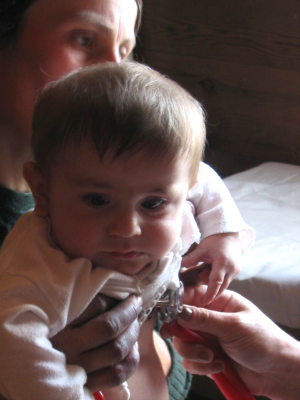RVF’s HIV screening programs benefited over 370,000 women and infants and are now being fully sustained by the local Ministries of Health. The program described below continues to be carried out without RVF’s direct involvement.
Program Highlights:
- Goal: To protect newborns from acquiring HIV infection from their mothers through timely, aggressive medical intervention
- The entire cohort of pregnant women – approximately 50,000 women in Georgia,150,000 women in Azerbaijan and 19,000 women in the city of Yerevan in Armenia annually – are being screened for HIV/AIDS
- HIV-infected women receive appropriate antiretroviral treatment to interrupt transmission to their newborns

The AIDS viruses can be passed from infected mothers to their newborns during the process of labor and delivery. Indeed, approximately 25% of HIV- infected women will transmit their infection if no preventative therapy is given laboring mothers and/or their babies. This prenatal transmission can be successfully prevented if two conditions are met: 1) Pregnant women are identified as carriers before labor has begun; 2) Caesarian section is made and appropriate therapy is begun for carrier mothers and /or their offspring.
In October 2005, RVF began an ambitious nationwide program in Georgia to protect the vulnerable population of neonates from acquiring HIV/AIDS from their mothers. Based on the successful program in Georgia, RVF launched an HIV/AIDS screening program in Azerbaijan in early 2009 and in Armenia in 2010. Working collaboratively with the ministries of health in each country, RVF has provided training and print materials to enable the country’s health care workers to perform rapid diagnostic screening for HIV/AIDS for the entire cohort of pregnant women. Women are tested at their first prenatal check-up. If rapid screening is positive, more extensive and definitive testing is performed at national testing centers. This definitive testing, funded by the Ministry of Health (MOH), identifies women who will receive effective antiretroviral treatment of HIV/AIDS (financed by the Global Fund) to prevent the transmission of the virus to their babies. Transmission rates are known to fall from 25% to less than 4% for HIV/AIDS when the program is successfully implemented. The RVF also donated special surgical kits to maternity hospitals for the performance of Caesarian sections to further support the interruption of the vertical transmission of HIV/AIDS .
By the time each Ministry of Health took over full responsibility for these screening programs, over 370,000 women and infants had been screened. Each annual birth cohort continues to receive this screening in Azerbaijan, Georgia and Armenia.
As with all RVF-supported programs, the HIV/AIDS screening and prevention program is implemented entirely through the existing public health infrastructure by local health care workers, so that from the very start the ministries of health and local healthcare workers have full ownership of the programs. The programs have been fully funded by the local Ministries of Health since beginning in April 2010 in Georgia and January 2013 in Azerbaijan and Armenia. This requirement of sustainability is an inherent part of all Foundation programs.